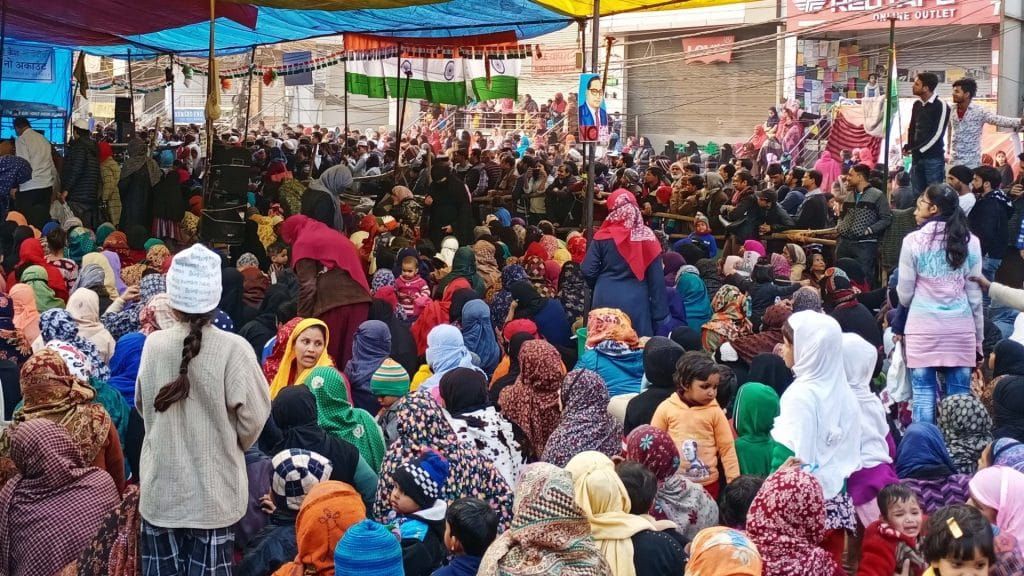Fake news epidemic: Coronavirus breeds hate and disinformation in India and beyond
By Matt Field | January 30, 2020
 For weeks, protestors have staged a sit-in against India's new citizenship law which they say discriminates against Muslims. Credit: DTM via Wikimedia Commons.
For weeks, protestors have staged a sit-in against India's new citizenship law which they say discriminates against Muslims. Credit: DTM via Wikimedia Commons.
Former White House Chief of Staff Rahm Emanuel once famously said, “You never want a serious crisis to go to waste.” He was talking in 2008 about the opportunities that a financial collapse presented to President Barack Obama and his new administration, but Emanuel’s assessment of moments of high public anxiety is true of many types of crises. And not all crisis responses are meant to produce positive results. Right now, for instance, scammers, conspiracy theorists, and political propagandists are exploiting the deadly coronavirus outbreak to maximum effect around the world.
In India, protestors have been rallying against an amendment to the country’s citizenship law, which many view as an anti-Muslim measure instituted by the Hindu nationalist government of Prime Minister Narendra Modi. One Twitter user with some 84,000 followers (and a blue checkmark indicating he has Twitter’s coveted “verified’ status), @Sanjay_Dixit, tweeted Thursday that there’d been a case of the virus among activists who were staging a sit-in to protest the law.
Dixit, whose Twitter profile indicates he is from Jaipur, a city to the south of New Delhi, and an author and “election and culture expert,” tweeted, “Someone just said that a confirmed case of corona virus has been found in the #ShaheenBaghProtest site. Please alert everyone and advise journalists to avoid going there. It is a dangerous epidemic. Issued in the interest of abundant precaution.”
But the sit-in that @Sanjay_Dexit references is in the Shaheen Bagh neighborhood of New Delhi, the country’s capital, which is in the northern part of the India. As of Thursday, the Indian Ministry of Health and Family Welfare had reported just one coronavirus-infected patient, a student who’d returned from Wuhan, China, to the southwestern coastal state of Kerala. Three other patients who had returned from China were reported to be under medical observation in a hospital in New Delhi, according to an article in Quartz on January 27. Presumably, as hospitalized patients who might be infected with a deadly virus, they weren’t allowed to amble about protest sites. @Sanjay_Dixit frequently disparages Muslims with tweets about “Islamofascism” and the “fascist nature of Islamism.”

In some countries spreading fake news about the virus can even land people in legal jeopardy. Government officials in Thailand announced police had arrested two people for spreading fake news, according to the Bangkok Post. Police searched 15 locations and arrested two people for computer crimes, according to the Post. One case involved spreading false information about coronavirus cases in Pattaya, a top tourist destination. Another person who was arrested allegedly had a hand in pushing out an edited video clip of a Chinese man collapsing. In Malaysia police arrested four people for allegedly sharing fake news on Facebook and Twitter, according to a government press release.
“Press freedom is maintained in this country, but spreading fake news and telling in order to cause a problem in Malaysia will not be tolerated and we will take action against them,” Malaysian Prime Minister Mahathir Mohamad said. The Malaysian suspects could face up to a year in prison, according to a Malaysian Communications and Multimedia Commission press release. The government announcement gave few details on what kind of content police are investigating.
Elsewhere, biosecurity experts debunked a theory, circulating online and in the Washington Times newspaper, that a Chinese government-linked lab, the Wuhan Institute of Virology, had caused the outbreak, the latest in a long-line of conspiracy theories linking outbreaks to various governments. In the past, conspiracy theorists have linked both the AIDS and Ebola viruses to government activity, for instance. “Rumours linking #coronavirus to biodefence facilities. Be very skeptical of these reports. They’re politically, not factually, motivated,” biosecurity expert and Bulletin columnist Filippa Lentzos tweeted.
The social media companies themselves have taken various approaches to suppressing fake news on their platforms, with mixed results. Twitter directs people who search for “coronavirus” to the US Centers for Disease Control and Prevention website. But a quick search on Thursday found @Sanjay_Dixit’s posts to be readily available.
China has reported more than 9,000 cases of the coronavirus infection as of Thursday, and more than 200 people have died, all in China. As international health authorities report new cases of the virus, the world will likely see more fake news purveyors trying to take advantage of what the World Health Organization has declared a global health emergency.
Read more Bulletin coverage on the Coronavirus outbreak here.
Together, we make the world safer.
The Bulletin elevates expert voices above the noise. But as an independent nonprofit organization, our operations depend on the support of readers like you. Help us continue to deliver quality journalism that holds leaders accountable. Your support of our work at any level is important. In return, we promise our coverage will be understandable, influential, vigilant, solution-oriented, and fair-minded. Together we can make a difference.
Keywords: Coronavirus, Disinformation, India, Malaysia, Narendra Modi, Shaheen Bagh, Thailand, Twitter, Wuhan, Wuhan Institute of Virology, conspiracy theorists
Topics: Disruptive Technologies















